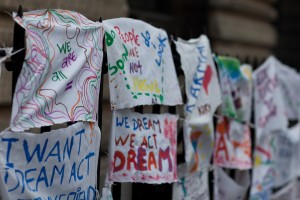DREAMERS: The New “Coming Out”
 The term has been synonymous with the gay rights movement, but recently college students have appropriated the idea and applied it to their immigration status. It’s become a deliberate “thing” that aims to put faces and names on the controversial DREAM Act issue.
The term has been synonymous with the gay rights movement, but recently college students have appropriated the idea and applied it to their immigration status. It’s become a deliberate “thing” that aims to put faces and names on the controversial DREAM Act issue.
Southern California Public Radio published a story describing the movment where college kids are outing themselves as a show of unity and defiance.
During the past week, a national campaign mounted by student immigrant advocacy groups has urged students and other young people to reveal their status. Advocacy sites have solicited coming-out stories via social media and posted them. Student groups around the country have held coming-out events, including one last week in Orange County.
The idea behind the DREAM Act is to grant conditional legal status to persons brought to the United States without documents before the age of 16 if they joined the military or went to college. The Act was defeated in Congress last December. Still, the DREAMERS believe that their movement has momentum and they’re willing to reveal their identity even if it means that by doing so they could be deported.
Those who choose to come out as undocumented say they are aware of the risks. At a coming-out event held by student activists last week in the city of Orange, Calif., some of those who lined up to announce their status in front of an audience of family, friends, professors and media said that coming out had made them feel a sense of relief, a weight off their shoulders.
The coming out movement has all the characteristics of social empowerment: support meetings and groups, a call for the need to create “safe spaces,” references to gay rights activists such as Harvey Milk who urged his peers:“you must come out.”
A participant at a recent coming out event put it this way:
“If you are not ready right now, you still have this fear. But within our own meetings, it is okay to talk about it. We’re in the same situation. We understand, we don’t judge. We let them know they can get involved without giving up their status.”
Some observers say that it is still too early to know if the movement will take hold.

